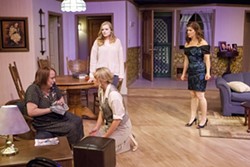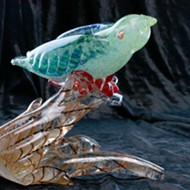[{
"name": "Ad - Medium Rectangle CC01 - 300x250",
"id": "AdMediumRectangleCC01300x250",
"class": "inlineCenter",
"insertPoint": "8",
"component": "2963441",
"requiredCountToDisplay": "12"
},{
"name": "Ad - Medium Rectangle LC01 - 300x250",
"id": "AdMediumRectangleCC01300x250",
"class": "inlineCenter",
"insertPoint": "18",
"component": "2963441",
"requiredCountToDisplay": "22"
},{
"name": "Ad - Medium Rectangle LC09 - 300x250",
"id": "AdMediumRectangleLC09300x250",
"class": "inlineCenter",
"insertPoint": "28",
"component": "3252660",
"requiredCountToDisplay": "32"
}]
Before playwright Lee Blessing wrote A Walk in the Woods and Fortinbras, he wrote a little domestic drama called Independence. Set in 1985, making it contemporary at the time it was written, Independence takes place in a single living room in Independence, Iowa, where a mentally unstable mother lives with her daughters Sherry and Jo. When her estranged oldest daughter Kess comes home after a four-year absence, the women find themselves bringing out the worst in one another, the way only families can.
Independence is currently being brought to life in a San Luis Obispo Little Theatre production, under the direction of Suzy Newman. Newman’s poignant turn as a schizophrenic housewife two seasons ago in House of Blue Leaves made it clear that she understands a thing or two about mental illness, guilt, and general dysfunction, and Independence has its fair share of all of these things. Here, Jill Turnbow, in a series of depressing housedresses uncomfortably reminiscent of hospital gowns, plays Evelyn Briggs, the matriarch driven to the verge of madness by bitterness and regret. Evelyn’s not crazy exactly, but she can certainly see it from where she’s standing. Turnbow, so brilliant in comedic roles, is capable of inverting this talent into something grotesque and frightening when called for, and this is one of those occasions.
While Kess (Makayla Dubois) is now a pantsuit-wearing professional living in Minneapolis, having evidently found small-town life incompatible with her sexual orientation, Jo (Alicia Klein) has rather begrudgingly stayed home to care for their mother, who several years prior suffered some sort of breakdown, followed by a stint in a mental health institution.
Kess’ return to Independence was motivated by a phone call from Jo, who said she had broken her neck—or tweaked it, anyway. A concerned Kess is angry to discover that Jo appears to be practically fine, until Jo explains that her injury was the result of her mother pushing her into the street. Why would their mother do that, Kess wants to know?
Because Jo is pregnant, it turns out. After remaining a virgin until well into her mid-20s, Jo has become romantically involved with a dubious character called Don. Upon learning of her pregnancy, Don offered to marry her, but Jo declined at her mother’s insistence. Evelyn, after all, was once in a similar situation. Now, it appears Don’s out of Jo’s life for good, though she remains hopeful.
The youngest sister, 19-year-old Sherry (Clara Jane Fulks), flippant, self-centered, and sexually brazen, often acts as a foil to Evelyn and, to a lesser extent, Jo. This situation is made all the more painful by the fact that Sherry’s mistakes, like Jo’s, seem to mimic those her mother made in her youth. But where Evelyn and Jo internalize their regrets, Sherry doesn’t seem to have any regrets at all, making for a constant war in the home. Now add a dash of crazy, and you’ve got yourself a drama.
The odd and frustrating thing about Evelyn’s mental state is that it isn’t quite bad enough for her daughters to have her committed. Under stress, Evelyn is prone to destructive outbursts, but most of the time she exists in an eerie state that blends jaded melancholy with childlike willfulness. Evelyn is quick to remind her daughters of things they did as children, and seems eager to recreate those activities despite the fact that her daughters are grown. She’s manipulative, giving her children grief for not spending enough time caring for her. Whenever the three women appear to be having a self-contained crisis that doesn’t involve their mother, Evelyn acts out, instantly redirecting the focus of the scene.
Act I concludes with one such outburst, though this one appears to be less a bid for attention and more a glimpse of true despair. The event shakes up the household, and in the act that follows, we see where everything lands.
Turnbow’s performance seems most crucial to the narrative. It’s her strong, complex portrayal that grounds the play, making the dilemmas of the three sisters believable. But Independence seems, in a subtle way, to be Jo’s story, and so much of its success rests on Klein as well. Sherry and Kess seem less susceptible to their mother’s manipulative grasp—Sherry with her teenager’s lack of empathy; Kess with her mature outlook and cooler head—but Jo’s heart breaks for her mother, practically on cue.
As Jo, Klein masters the middle-child temperament, clearly jealous of her older sister’s freedoms and resentful of her younger sister’s devil-may-care attitude. Her voice becomes slightly shrill when anxious or protesting something; her movements are quick and hurried. Her servant’s posture seems to convey Jo’s modest opinion of herself.
The 17-year-old Fulks is a good fit as Sherry: The characteristic teenager’s walk, pout, and bored slump into a couch all seem to come organically. Less organic is Fulks’ delivery, which occasionally sounds less like dialogue and more like lines (a snappy retort coming too quickly to be realistic, for example) though this will probably work itself out over the course of the production’s run.
The set and costume design—the work of Randon Pool and Dave Linfield, respectively—is certainly ’80s, though not parodyingly so. (Although Sherry sports some jeans in Act II that seem intentionally hideous, as if Pool were poking fun at the fashions of the decade. As Sherry stomps offstage, the baggy, high-waisted fit makes her seem that much more ridiculous.)
The Briggs’ house is relatively spare but has a lived-in feeling to it. There are few overt signifiers of the decade present; rather, the place feels like an accumulation of past decades—an appropriate metaphor for Evelyn’s own life.
Independence is not entirely an ironic title, as it is Jo who must win hers or become further mired in her mother’s neediness. Among other things, the play’s dramatic question appears to concern the oft-conflicting needs of following one’s own path versus caring for one’s aging parents. The answer isn’t always pretty.
Arts Editor Anna Weltner was born on the 4th of July. Not really. Contact her at [email protected].












